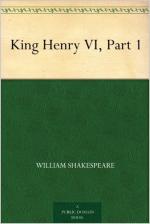|
This section contains 654 words (approx. 2 pages at 400 words per page) |

|
King Henry VI, Part 1 Summary & Study Guide Description
King Henry VI, Part 1 Summary & Study Guide includes comprehensive information and analysis to help you understand the book. This study guide contains the following sections:
This detailed literature summary also contains Further Study on King Henry VI, Part 1 by William Shakespeare.
Although Shakespeare's Henry VI, Part One was written over four hundred years ago and deals with events almost two hundred years before that, it speaks in so many ways to modern audiences. It talks about war, marriage, politics, religion, and family in very contemporary language. In the last century and more, people have witnessed the extraordinary brutality of armed con flict. The Civil War, World Wars I and II, the Korean War, the Vietnam War, and the war of Yugoslavian disintegration among others have become the stuff of shared cultural experience. So, when Salisbury is wounded at the siege of Orleance by a "piece of ord'nance" (I.iv.15), the reader understands, even expects, the result: one of his eyes and pan of his face is blown off. And so, when young Talbot dies in a "sea of blood" that "did drench / His overmounting spirit" (IV.vii.14, 15), readers can imagine what he would have looked like because they have seen the terrible effects of war first hand, or in photographs, on television, or on video. With regard to marriage, Shakespeare raises the issue of its relation to love in terms that this age of palimony and prenuptial agreements can understand. When Suffolk tries to persuade the king to marry Margaret, daughter of the duke of Anjou, and prove faithless to his betrothed, the daughter of the earl of Arminack, he comments that money and legal agreements don't matter when it comes to love: "Marriage is a matter of more worth / Than to be dealt in by attorneyship" (V.v.55-56), that arranged marriages spell disaster; marriages for love promise happiness:
For what is wedlock forced, but a hell, An age of discord and continual strife? Whereas the contrary bringeth bliss, And is a pattern of celestial peace. (V.v.62-65) Some readers would probably agree with Suffolk's assertion, but there are many religions in which arranged marriages are the norm.
Henry VI, Part One is pre-eminently a play about politics. In the absence of a strong ruler (the king is very young and irresolute in this play), the Yorkists and Lancastrians vie for power. In the famous Temple Garden scene (II.iv), on the one side line up Richard Plantagenet, Warwick, Vernon, and a lawyer; on the other, Somerset, Suffolk, and Basset. For a modern audience, such factionalism is not unusual. One need think only of what happened to Yugoslavia after the death of Tito or Russia after the decline of strong, centralized Communist con trol to recall the deadly infighting that occurs in a power vacuum. A far less extreme example of the result of factionalism is the gridlock that often paralyzes the United States government due to the differing agendas of Democrats and Republicans. Shakespeare's play ends on a note of foreboding, with Suffolk vowing to continue the political game of manipulation through his love for the king's future wife, Margaret, the duke of Anjou's daughter. As for religion, Henry VI, Part One gives center stage to the conflict between two countries convinced that each has God on its side. At Henry V's funeral, the bishop of Winchester eulogizes: He was a king blest of the King of kings. Unto the French the dreadful Judgment Day So dreadful will not be as was his sight. The battles of the Lord of hosts he fought. (I.i.28-31)
On the French side, Joan de Pucelle (Joan of Arc) is called the "holy maid" inspired by "Heav en and our Lady" (I.ii.51, 74). The French are convinced that she has been sent by God to rescue France from English domination; Shakespeare, how ever, in a scene that may suprise American audiences brought up to see Joan of Arc as a liberator, has her conversing with fiends (V.iii). For many English, Joan of Arc has typically been viewed as a despised figure, someone who took away land that many believe was rightfully theirs.
Read more from the Study Guide
|
This section contains 654 words (approx. 2 pages at 400 words per page) |

|



